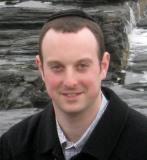NSU Newsroom
SharkBytes
Horizons
This version of NSU News has been archived as of February 28, 2019. To search through archived articles, visit nova.edu/search. To access the new version of NSU News, visit news.nova.edu.
This version of SharkBytes has been archived as of February 28, 2019. To search through archived articles, visit nova.edu/search. To access the new version of SharkBytes, visit sharkbytes.nova.edu.
Obsessive Compulsive Disorder Affects Many in Communities Across the Nation
OCD Awareness Week (October 13-19, 2014)

Jedidiah Siev., Ph.D. Center for Psychological Studies
FORT LAUDERDALE/ DAVIE, FL. – John is your next door neighbor. Every day, John experiences frightening intrusive thoughts of losing control and violently stabbing himself with knives. He does not want to hurt himself, and desperately tries to banish these thoughts from his mind and reassure himself that he would never act on them – to no avail. He even insists that his wife remove all knives from the house just in case having such thoughts portends his eventual loss of control. In the short run he feels somewhat relieved, but in the long run the thoughts and fears and uncertainty return.
John has obsessive compulsive disorder (OCD). And he’s not alone.
OCD is not a disorder of quirkiness (“I am sooooo OCD”) or being finicky about germs. It is a disorder where individuals experience unwanted, intrusive thoughts, images, and urges that cause distress (obsessions), and engage in repeated behaviors or mental acts in efforts to reduce that distress (compulsions). It is heterogeneous and opportunistic: it latches onto whatever is important to the person struggling with it. Fears can manifest as violent and aggressive, inappropriate sexual images, and nearly anything else, including symptoms many think of as prototypical, like concerns about contamination or need for symmetry and exactness. There are times when OCD even masquerades as religion, such as when individuals have symptoms related to unwanted blasphemous thoughts or excessive fears of sin that exceed religious standards.
Just how common is OCD?
In an average elementary school there are likely five children suffering from OCD. In a medium to large high school, there are typically 20 students battling OCD. And in a workplace of 500, there would be about five employees who have OCD, most likely hiding their symptoms from their colleagues. OCD is in every community and those affected should not feel ashamed or embarrassed.
In most cases, OCD and related disorders are treatable conditions. However, studies show that people suffer unnecessarily for years because of lack of information and a shortage of therapists trained to properly diagnose and treat these problems. But this doesn’t have to be the case.
International OCD Foundation’s OCD Awareness Week (October 13-19) is an opportunity for community members to learn more about OCD and its treatment. The IOCDF helps people find treatment that will curtail their suffering and allow them to lead more productive lives. It also funds research and provides support for OCD sufferers and the families and caregivers of OCD patients.
There’s no reason to suffer with OCD – help is out there. For those looking for help, a variety of IOCDF resources can be found online (http://iocdf.org).
For those in Southeast Florida, the Anxiety Treatment Center’s OCD and Related Disorders Program at NSU offers state-of-the-art OCD treatment with demonstrated efficacy in cutting edge research. Those interested can get more information about NSU’s Anxiety Treatment Center by calling 954-262-5822.
Jedidiah Siev, Ph.D.
Assistant Professor, Nova Southeastern University
###
About the Author: Jedidiah Siev, Ph.D., is an assistant professor in NSU’s Center for Psychological Studies and the director of NSU’s Anxiety Treatment Center and the OCD and Related Disorders Program. Siev completed a post-doctoral fellowship and pre-doctoral internship at the Massachusetts General Hospital and Harvard Medical School, following doctoral training at the University of Pennsylvania. For more information, please visit http://cps.nova.edu/faculty/profile/siev.html
About Nova Southeastern University: Situated on 314 beautiful acres in Ft. Lauderdale, Florida, Nova Southeastern University (NSU) is a dynamic research institution dedicated to providing high-quality educational programs at all levels. NSU is an independent, not-for-profit institution with 26,000 students at campuses in Fort Lauderdale, Fort Myers, Jacksonville, Miami, Orlando, Palm Beach and Tampa, Florida as well as San Juan, Puerto Rico. NSU awards associate’s, bachelor’s, master’s, specialist, doctoral and first-professional degrees in a wide range of fields. NSU is classified as a research university with “high research activity” by the Carnegie Foundation for the Advancement of Teaching, and it is one of only 37 universities nationwide to also be awarded Carnegie’s Community Engagement Classification. For more information, please visit www.nova.edu. Celebrating 50 years of academic excellence!